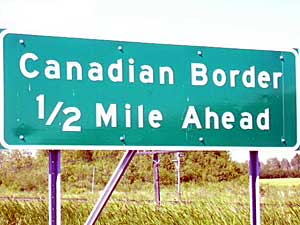"We should at least show that we are willing to do everything we can to protect the U.S. against terrorists," writes former Globe and Mail bureau chief Anthony Westell in CBC News Viewpoint (www.cbc.ca/news/viewpoint). Attendant to this would be a certain loss of sovereignty, possibly a U.S.-led continental border command, and the presence of U.S. officers at Canadian ports. But according to Westell, all would be acceptable.
Why? Because the threat of terrorism is clear and present, and more than ever misinformed officials south of the border are referring to Canada as a hotbed of terrorism. Or because a terrorist attack on either side of the border would lead to that border shutting down, at great economic cost to Canada.
Westell is bang on when he states that the perceived threat emanating from Canada is pure nonsense, or that, ostensibly because of the recent arrest of the Group of Seventeen, Canada is no longer in a position to disabuse the U.S. of the view that Canada is some sort of Club Med for terrorists. There is no fault, either, with Westell's argument that lives lost notwithstanding, the principal victim of a terrorist attack occurring on Canadian soil would be economic.
 Where my opinion differs from Westell's, however, is when he argues that irrespective of the U.S. misconceptions about Canada, we should accept a loss of sovereignty and demonstrate that we are willing participants in continental defense. Westell uses the threat of Soviet nuclear missiles pointing indiscriminately at the common North America "we" as a period in our history when we accepted to give away some of our sovereignty in the name of security, what with organizations such as NORAD. Unfortunately, this is a false analogy, as the nature of the threat was an altogether different, much likelier (through willful attack or accidental) one, and the consequences of an attack were orders of magnitude more severe. Numerous observers have used Cold War analogies and juxtaposed them with the current template, but that simply is academically irresponsible.
Where my opinion differs from Westell's, however, is when he argues that irrespective of the U.S. misconceptions about Canada, we should accept a loss of sovereignty and demonstrate that we are willing participants in continental defense. Westell uses the threat of Soviet nuclear missiles pointing indiscriminately at the common North America "we" as a period in our history when we accepted to give away some of our sovereignty in the name of security, what with organizations such as NORAD. Unfortunately, this is a false analogy, as the nature of the threat was an altogether different, much likelier (through willful attack or accidental) one, and the consequences of an attack were orders of magnitude more severe. Numerous observers have used Cold War analogies and juxtaposed them with the current template, but that simply is academically irresponsible.A self-respecting nation cannot allow another state's groundless fears, or that state's economic clout, to dictate how we are to behave within our borders. To give in would represent the abandonment of who we are and allow irrational, misinformed paranoids in the U.S. to determine a course of action that should be ours only to choose. This, in turn, would undoubtedly lead to harsher security measures in and around Canada and a further erosion of the foundations of the liberal democracy we have been building for many years. Under this new system, the Group of Seventeen, which for all intents and purposes is already being denied due process, would stand even less of a chance to a fair trial.
I am fully aware that international relations are as much about truth as they are about perception, mythmaking and illusion, but this in no way can justify the submission of a state to the bullying of another, however stronger the other might be. This isn't to say that Canada doesn't need to be vigilant in its immigration and security intelligence efforts—it most certainly has to, and it is blessed with enough intellectual and financial resources to do that. But whatever needs to be done, we can do without the abandonment of who we are.

Here are some links that I believe will be interestedhttp://google-index.info/2922.html or http://indexmachine.info/2113.html and http://google-machine.info/327.html
ReplyDelete